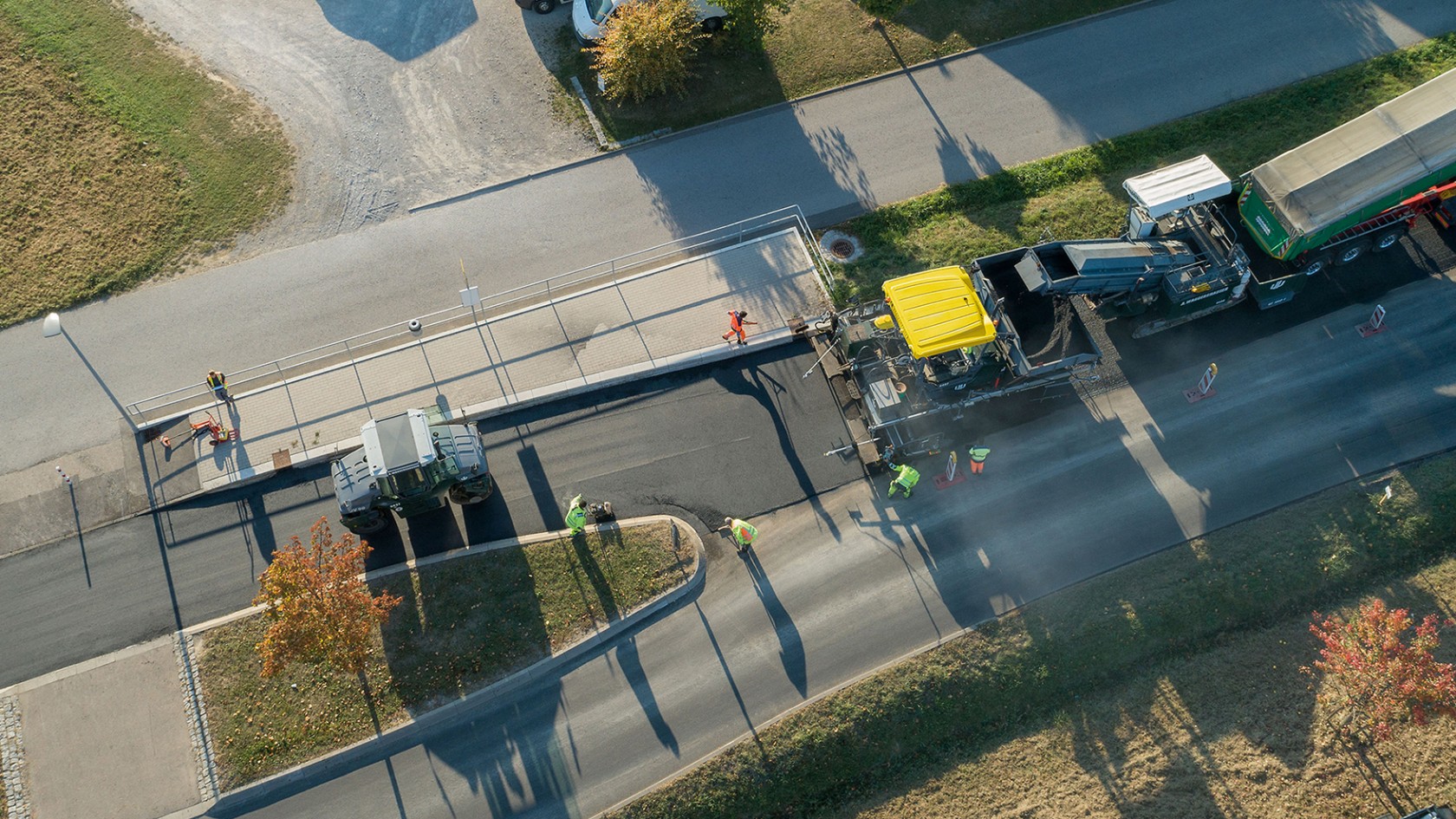Digital construction project with WITOS Paving Plus


QSBW 4.0 is the German abbreviation for “Quality in Road Construction in Baden-Württemberg 4.0” and it is ringing in a new digital era in road construction in Germany’s southwest. It will be included in public invitations to tender as of 2019, and become standard by 2021. The state of Baden-Württemberg is playing a trailblazing role with this initiative, pushing road construction into the digital age in a bid to improve the quality of asphalt paving, process safety and cost efficiency.
Germany | Baltmannsweiler
A VÖGELE road paver with the WITOS Paving Plus process management system and HAMM rollers with the WITOS HCQ module participated in a QSBW 4.0 construction project.
The contractor, A. Waggershauser Straßenbau GmbH + Co. KG, based in Kirchheim/Teck, won the bid for a job requiring compliance with the QSBW 4.0 standards for the improvement of process quality in road construction. The project involved the rehabilitation of a section of the L1150, a regional road in the municipality of Baltmannsweiler. The 4 cm-thick surface course had to be renewed along a 2.1 km stretch.
Invitations to tender based on QSBW 4.0 criteria require the inclusion of all the system components associated with a digitally controlled and monitored job site as defined by the QSBW 4.0 initiative. Specifically, these include dynamic logistics and machine control systems, as well as process documentation.
VÖGELE developed WITOS Paving Plus with just such requirements in mind, and this was the solution that Waggershauser elected to use. It is a fully integrated, software-based overall system for process optimization and documentation, comprising five inter-coordinated modules for the different parties involved in the process – from the asphalt mixing plant and the lorry driver to the site manager. With WITOS Paving Plus, contractors can already meet virtually all the requirements affecting road pavers which will generally be specified in future in invitations to tender under QSBW 4.0.
The suffix “4.0” indicates the digital objective of the initiative: “Industry 4.0” is the name of the high-tech strategy aimed at linking industrial production systems with the latest information and communications technology on the basis of intelligent, networked systems.
QSBW 4.0 provides for implementation of a quality management plan, which defines the parameters a contractor has to monitor independently. These include, for instance, paving temperature and speed, as well as compaction. Logistics aspects also have to be planned, however, including daily laydown rate, supplier plants, mixing output, round-trip times of lorries, number of vehicles and much more. Recording these target data supports a controlling process that is based on real data from the job site.
WITOS Paving Control, one of the five WITOS Paving Plus modules, is available for planning and monitoring. All the required data can be entered here, and it can even be used to select the necessary machines and material quantities, as well as their availability in terms of time. Based on this information, any deviations from the planned workflow can be identified and corrected later on in the construction process.
Axel Gairing, A. Waggershauser Straßenbau GmbH + Co. KG
Baden-Württemberg’s Ministry of Transport has hailed the rehabilitation of the L1150 in Baltmannsweiler as a successful “milestone in the digitalization of road construction”. The process known as “Quality in Road Construction in Baden-Württemberg 4.0” (QSBW 4.0) was developed by the Ministry of Transport of Baden-Württemberg in collaboration with companies in the construction sector and summarized in a manual. The process has been trialled in a competitive environment since 2018.
The objective of QSBW 4.0 is an uninterrupted and digitally controlled construction process designed to ensure excellent paving quality over the entire pavement, increasing the service life of asphalt layers.
Temperature measurements are the focus of the quality control measures specified in QSBW 4.0. Because asphalt can only be paved and compacted in specific temperature ranges, the mix temperature must be monitored during loading, transfer to the paver and paving across the entire surface behind the screed.
With WITOS Paving Plus, that is easy to do: the Materials module can record the mix temperature at the time of transfer at the mixing plant. The temperature at the time of transfer to the paver can be measured at the job site. And the temperature data immediately after paving are supplied by the infrared camera which forms part of VÖGELE’s RoadScan temperature-measurement system. It precisely scans the entire specified area across a width of 10 m. Because RoadScan, just like WITOS Paving Plus, is integrated in the ErgoPlus 3 paver operating system, the paver operator has access to temperature data right on his console. Construction managers can also check the data online from their offices via the WITOS Paving Control module.
From planning, recording job site data, and precise document-based accounting to identifying improvement potentials – digital process management makes construction projects transparent. And that is of major importance to clients who want to ensure quality and keep an eye on costs. This is where QSBW 4.0 comes into play.
The same applies to WITOS Paving Analysis, the fifth module of the VÖGELE process management solution. This analysis, statistics and documentation tool monitors the entire process chain. The clearly structured diagrams and charts enable the construction manager or planning engineer to draw important conclusions from a completed construction project, for instance relating to the paving efficiency.
Analysis of the job site in Baltmannsweiler clearly demonstrated the benefits of digital process control. Thanks to perfect cycle calculation and optimization of the paving job, paving efficiency when laying down the surface course totalled 99%.
In short, WITOS Paving Plus helped avoid downtime – also passing its field test with this QSBW 4.0 project.
The VÖGELE system for process optimization and documentation comprises five modules – tailored to the individual parties involved in the process.